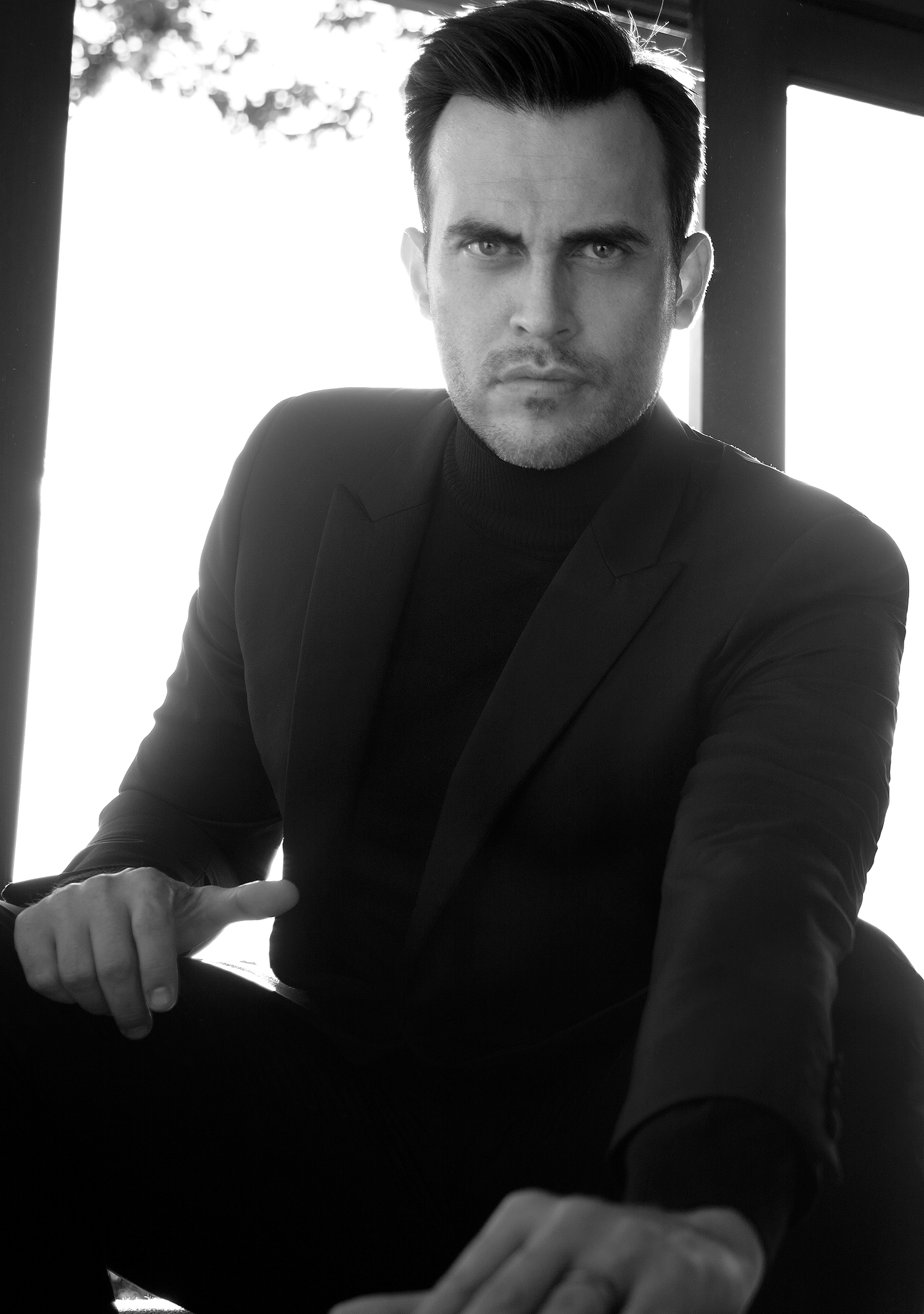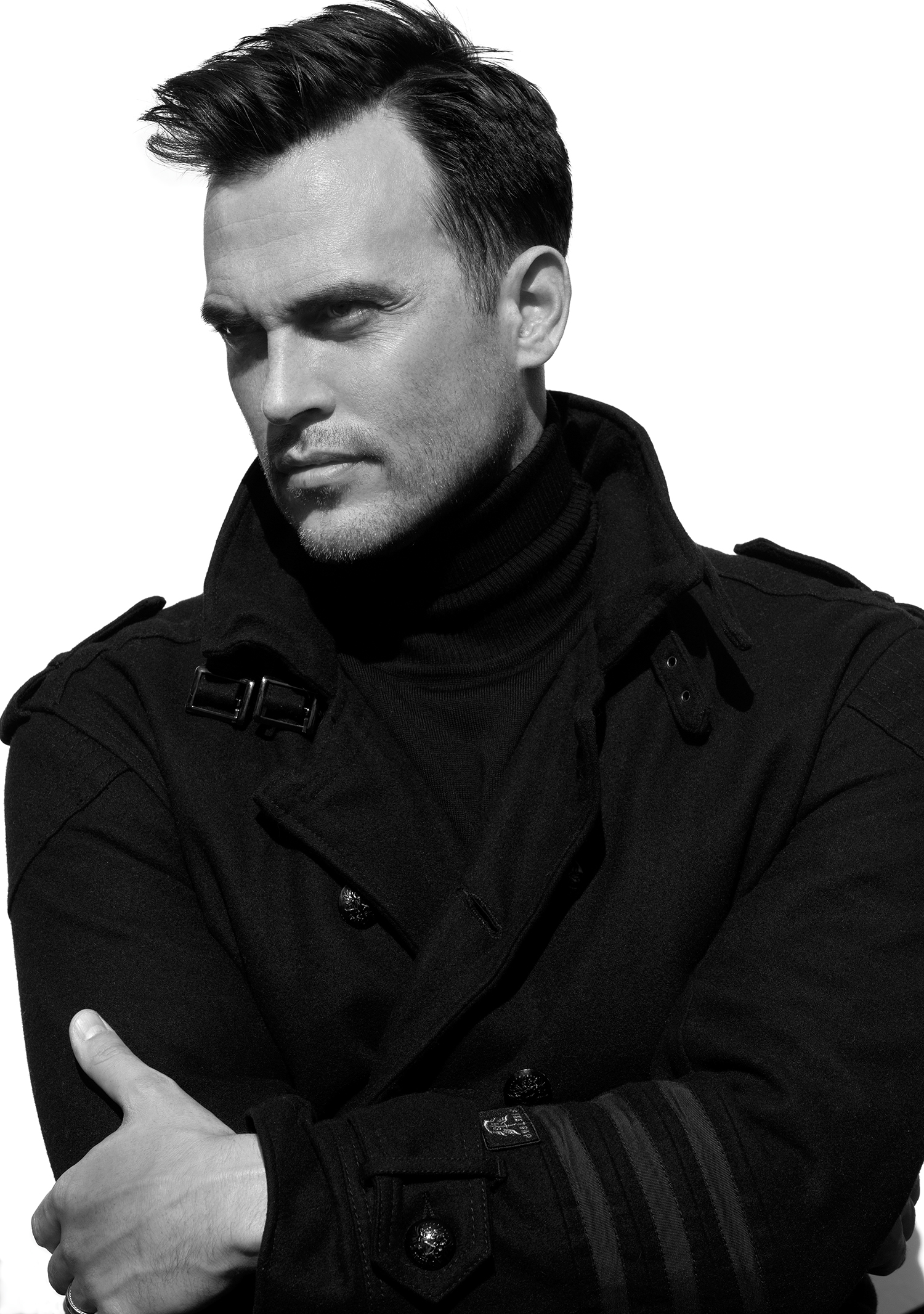COVER STORY – JIM PARSONS
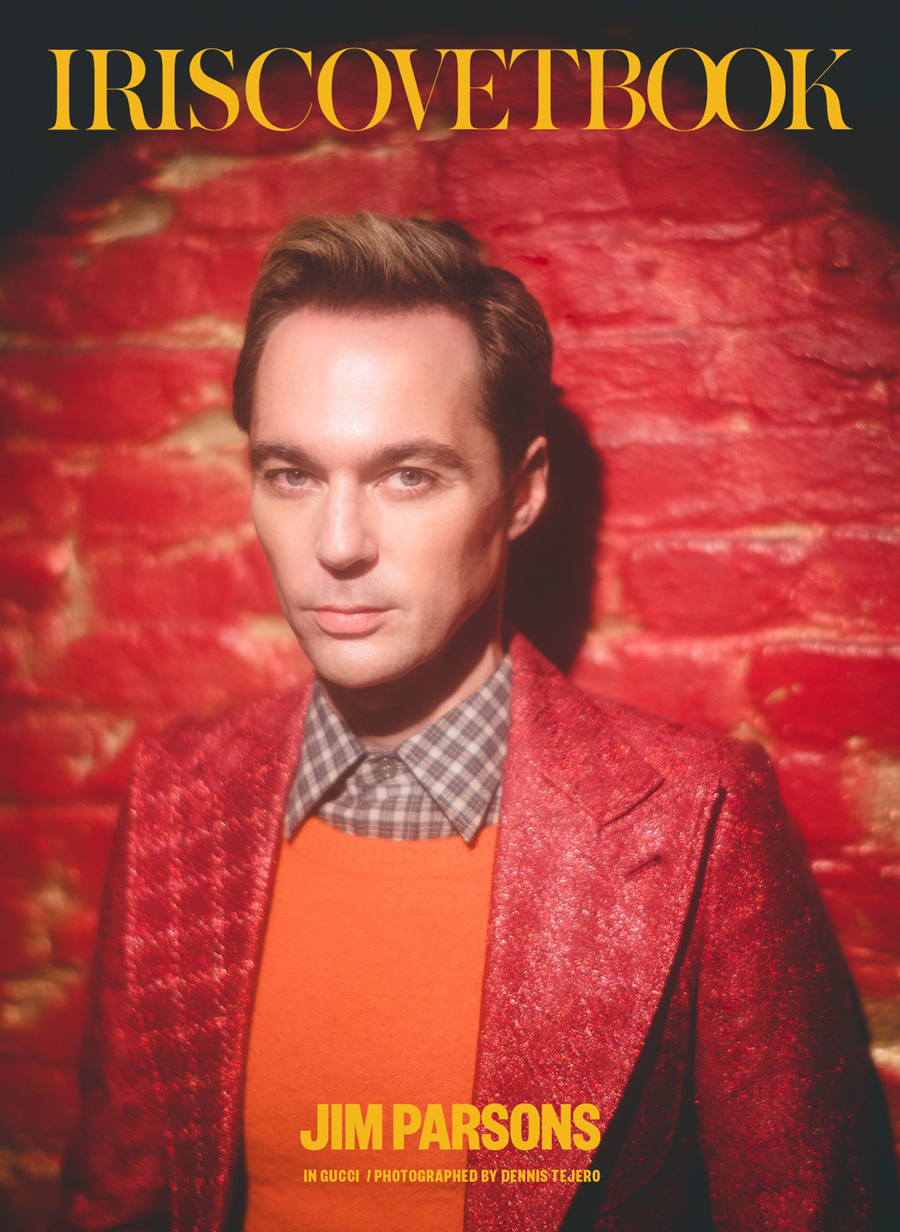
Photography: Dennis Tejero at ADB Agency
Fashion Editor/Interview: Marc Sifuentes
Grooming: Melissa Dezarate at The Wall Group
Production: Savvie
Photo Assistants: Ben Kasun, Jai Castillo
Location: The Stonewall Inn
A sharp tongue, quick wit, and great timing have often been the ingredients necessary to make a movie star, but the ability to spin those talents into a career of longevity and diversity are far rarer.
Born and raised in Houston, TX, Jim Parsons followed a winding path of community theater, small gigs, and part-time commercial acting until his break-out role as Sheldon on “The Big Bang Theory”. While many actors struggle to break free of such well-known characters, Parsons’ talent and industry acumen have helped produce a portfolio that includes a starring role and a Golden Globe nomination for his performance in Ryan Murphy’s “Hollywood”, an independent production company with his husband, Todd Spiewak, and numerous accolades for his role in Netflix’s The Boys in the Band.
In an interview with the multi-hyphenate, we got a look into the road map that turned Parsons into the well-known and well-accoladed actor and producer he is today. With us, Jim explores a perspective shift of a young man interested in community theater in Houston to an artist trying to make ends meet in New York, the untimely death of a father that inspired a new chapter in his career, and wrestling with his identity as a gay man in a world just starting to normalize his identity.
Parson’s outlook, unique in its optimism and trust in himself, is ultimately infectious and inspiring. From coping with personal tragedy to starting a new chapter in life, Jim Parsons has always tried “not to grasp the sand too hard and just let things happen,” and it seems to have worked so far.
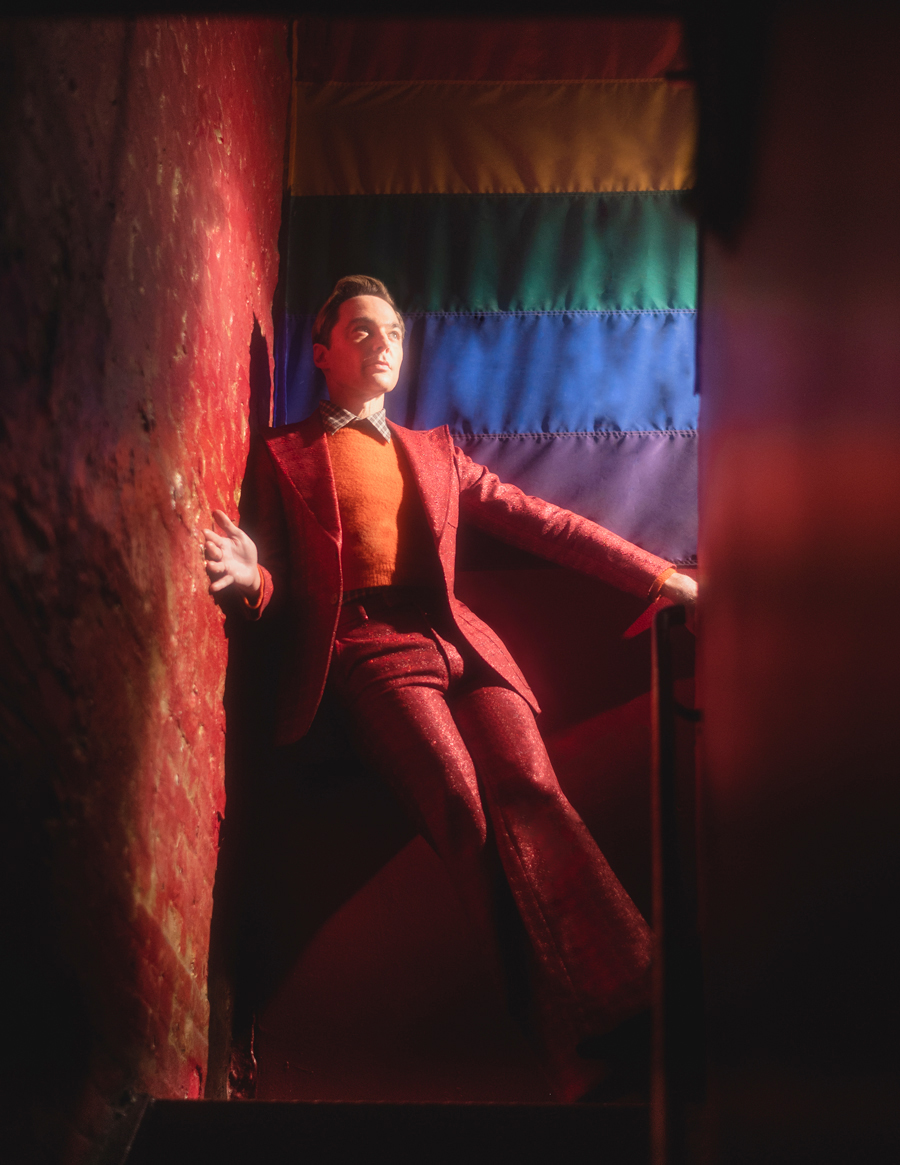
Suit, sweater and shirt by Gucci
When you were growing up in Houston and you became inspired to get into the world of the arts, was it always in the form of theatre that you were drawn to?
Yes, it was immediately. I knew that I wanted to be an actor. My mother had these children’s books “What Do You Want to be When You Grow Up?” type of books, and for years I would say I wanted to be a movie star. I don’t know what I meant by that, and I don’t know what triggered it. I know I was in a play in first grade which obviously made a big impact. But I don’t actually remember that being the turning point.
I will say that my love of theatre is just a fortunate act of circumstance. We had plays in our school, and I did them, but that was the only outlet I had for acting as a youngster growing up in Houston. It’s not like my parents were getting me into auditions for local movies or anything, we didn’t even know how to do such a thing.
Houston has an incredible art scene. But, growing up there, I wasn’t exposed to the arts until I was in high school. I worked as an usher when I was around sixteen for the big theatre spaces in downtown like Jones Hall, The Wortham or the Alley Theatre. So, I think it’s interesting to hear when you became aware of these outlets particularly the more underground ones, like the now-defunct independent theater company, Infernal Bridegroom Productions?
I honestly wasn’t very motivated during my junior and senior years before going into college. I didn’t know what I wanted to do or what I wanted to get into. I mean acting seemed very risky and luckily my parents were never discouraging to me, but they weren’t people who came from a situation where acting was even an option. Like they wouldn’t have pushed me in that direction either. So, my first year at the University of Houston I personally didn’t do theater, but I was around people who were doing it. And by the end of my first year, I felt very strongly that I needed to give it a shot. There was nothing else in my life going on. It’s kind of like when people always ask you if there is anything else you can do. I felt at that point in time there really wasn’t anything calling me. Everything else sounded like I was just settling.
What were you going to college for at the time?
I don’t know what it’s called anymore. Something in the communications department like radio and television. I guess I thought that maybe I would go into broadcast, like a weatherman or something. But looking back, it was naïve that I didn’t realize that you needed to major in journalism, or you needed to major in meteorology you know, and the on-camera stuff would be obviously secondary to that.
Infernal Bridegroom came from eventually being in theatre at the University of Houston I was brought to them by another classmate that was already involved. I had been doing some college shows and I was really having a great time, but I found the idea of doing things out of the scholastic environment, with a different group of people and surroundings, really exciting.
IRIS: Looking back now, what advice would you give to young actors that are just starting out. Do you think it still stands true today to say yes to everything? Which in your case, also meant working for free a lot of the times?
Yes, I do firmly believe that saying yes to as many things as you can is really the key. It’s easier said than done because the hard part is making sure you find the right people or situations that have opportunities to offer.
Just like any other job, there’s only so much you can teach, only so much you can theorize about. But when you’re acting on a stage with lights on you and people staring at you, there’s no substitute for getting used to that unless you are doing it. So much of it is about building confidence. That’s what it was about for me. And then, of course, if you want to make a career out of it, there does come a point in time where you have to decide I’m no longer working for free. I don’t remember ever saying I’m not going to work for free anymore that never happened for me. Hell, I’d still work for free depending on what the project was.
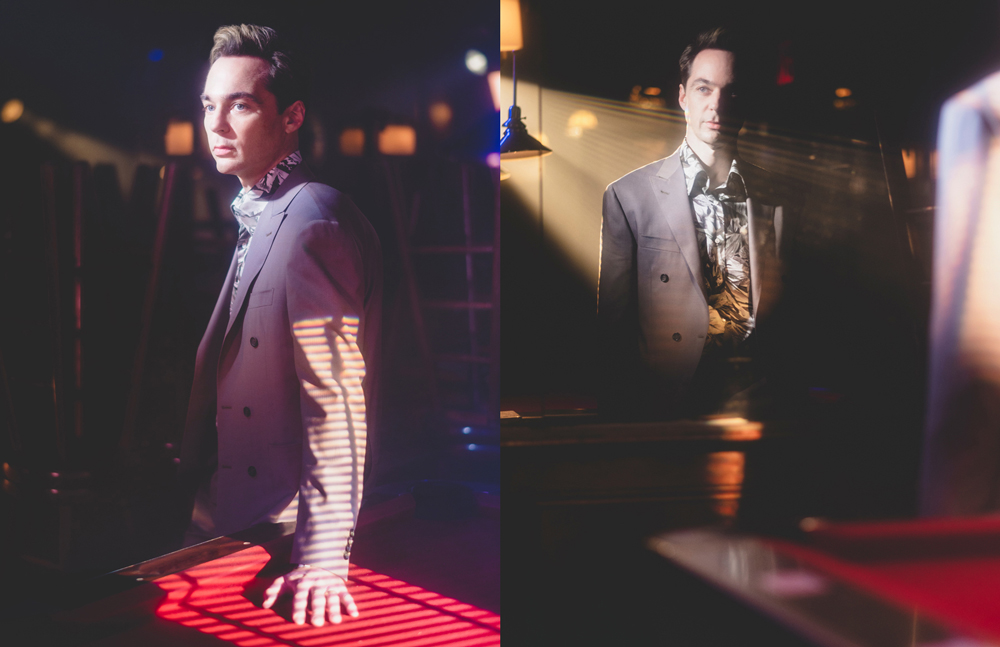
Suit and Shirt by Canali
IRIS: What was the main motivating factor that pushed you out of Houston and to New York?
I remember I was really getting to do a lot of work in Houston, and I was very happy with it in many ways, but there was a practical side of me that was like, “I don’t think I’m going to be able to do this,” since at the time there were so few people that were able to make a living off acting in Houston. So I kind of felt strongly that it was New York or LA.
I went to grad school and did a showcase in New York, and I knew a couple of people living here already. So a friend let me live with him, and it just kind of made sense. It’s funny going over any of this with you just how much scarier it sounds to me looking back than it did at the time. It felt like I didn’t really have much of a choice at the time. I felt this is just what I needed to do, this is what I am going to do. But looking back, I know all these things fell into place, all the fortunate things that happened or people I met. It’s now so easy to see the thread being pulled and things completely changing for me. So that’s the advice I would give a young actor – let your ignorance be your bliss and keep going.
IRIS: I read that you were doing some commercial work and then you ended up with a contract with CBS. So then would you say that your first big break was the “Big Bang Theory?”
Yes and no. It was definitely the big break in the obvious way of a lot of people seeing the show and being a consistent, well-paid acting job, but honestly it was the little things that came together. It was the commercials, the off-Broadway plays. They weren’t things that a lot of people were seeing, and they weren’t providing enough of a stable income, but I met great people. Again, it goes back to building the confidence. It felt like I was on the right journey and that was crucial for me. I think it’s so hard to wonder when or if anything is going to happen, and it is these little paths along the way that kind of give you a tiny little shove. They all add up. When I did get the audition for “Big Bang” I felt it was the appropriate time. I didn’t know if I was going to get it, but I didn’t feel like I was unworthy. I felt like, “I’m here and I’ve been working and I’m trying to get things going.” And so that’s what I would say about the big break. It was all the tiny little ones before that.
IRIS: I was thinking about being a lead in a successful show like Big Bang, which is in syndication and can be seen anywhere in the world on any given day. Did you ever feel you might want to break away from being Sheldon for fear of being typecast?
What I realize now, as far as typecasting goes, is if that if they want to typecast you, there’s really not a lot you can do to stop them. I was fortunate enough to find a few people who are interested in working with me on other things and taking a journey on projects outside my realm. That’s where I’ve been very fortunate, and I feel so very grateful.
I never would have wanted to stop playing Sheldon because of the association with him or the show, or for fear of being typecast. I knew it was the end of the line for me, not because I didn’t want to do it anymore, but because I felt it had run its course. And I don’t mean that in a bad way. I can’t imagine something I could list that I’m more grateful for than that entire experience. But twelve years was a long time for me to play a fairly intense character. He’s a big personality, you know? I was going to be 47 when those twelve years ended, and my dad had died when he was 52, and that just gave me a very unique perspective. I said to myself, “you know what? What if you’ve only got six years left to live?” And looking at it like that, there’s other things that I need to get done.
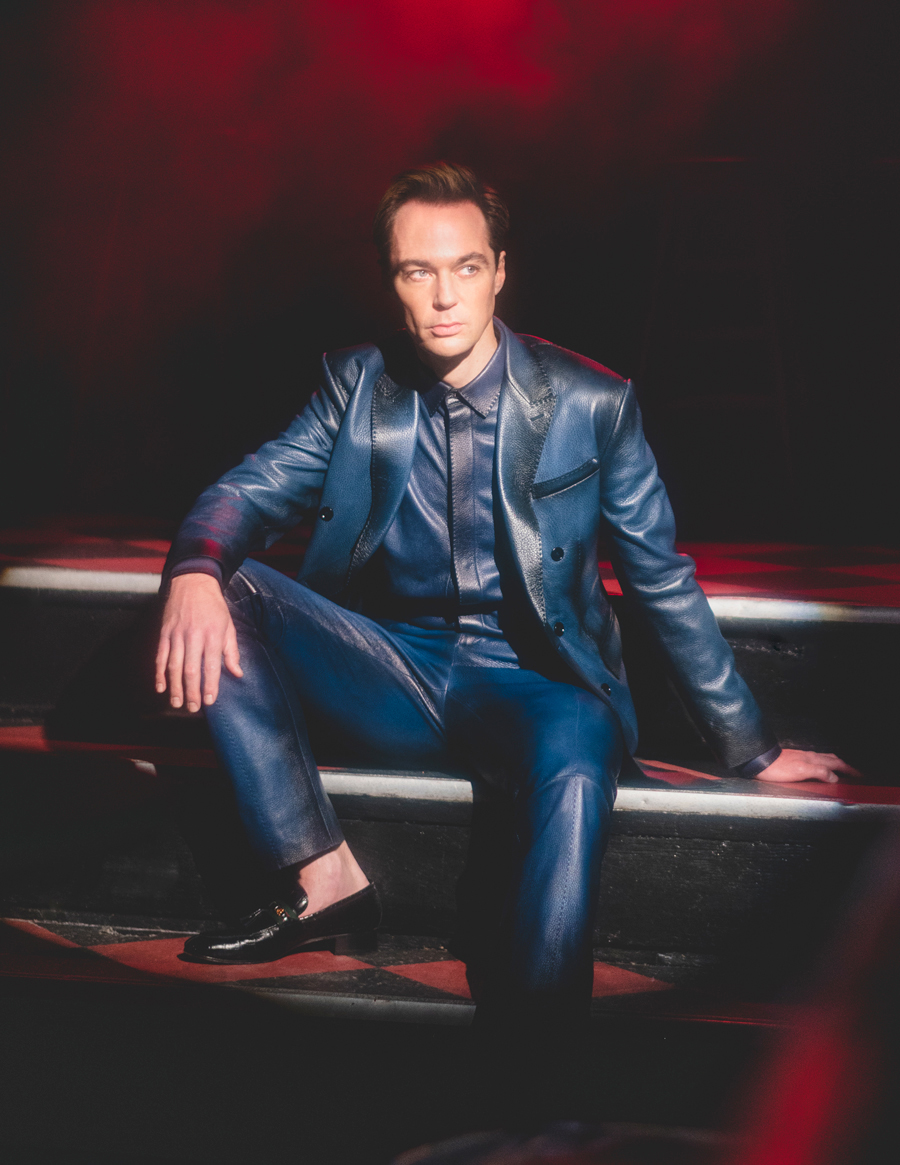
Suit and Shirt by Berluti, Shoes by Gucci
IRIS: Which brings us to your latest venture as the head of your own production company. It has already produced some pretty successful shows for Netflix, HBO and Fox. How did you start this new foray into producing?
I did not know if I wanted to do it at first. I did not know exactly what it meant to do it. I am still five years into this and still learning what it means to do it. But I did feel it was a real gift, and I wasn’t afraid of failing at it. I felt that no one was going to care if I succeeded at it or not, but if we have this opportunity we should take it. I use the word ‘we’ because my deal is very specifically both mine and my husband Todd’s. I would not have done it without him. I knew that for sure and if anything, I’ve only learned that to a greater and greater degree as this has gone on. Todd wasn’t in the business until he met me. He sees things much differently than I do. When we’re looking at something at the production company, I can see his brain work differently, receiving information about shows or scripts or whatever. He’s very good at dealing with all the different personalities involved, I’m really not, and that’s been one of the main reasons this has been a successful venture so far.
IRIS: Speaking of your husband Todd, I was watching an interview where you were talking about you two meeting on a blind date nearly nineteen years ago and I was curious, when did you know that he was the one? Was it love at first sight?
No, but I did know very soon. I won’t say that night only because I was always a little too stable for thoughts like that. He would argue with me on that one. I would say within a couple of weeks after the first blind date almost nineteen years ago, I knew that this was very much worth pursuing, and I knew that I thought he was very special. You know, we met November 15th, and by the end of December I had basically moved into his apartment. It was really the most romantic time of my whole life. I’ll never forget he took off a week from work for the holidays in December and I had never had so much fun as running around New York with him. I remember going to the coin cashing machine at the supermarket on New Year’s Eve, and he had two pillowcases full of loose change that we dumped into the machine, and that’s what we used to go out that night. I remember we got pizza and bought alcohol. I don’t know, everything was just through rose-colored glasses that’s for sure. We just had our 18th anniversary together.
We got married in 2018. But you know back in 2002 when we met, gay marriage was barely a thing. It wasn’t legal yet. It was a long evolutionary process for me to care about getting married, it really was. It took me a long time to realize that, not having seen examples of gay marriage, I had lived so much of my life without that dream. It was part of the reason it became important for me to do it. I really wanted our relationship to contribute to the visibility of gay marriage and help people have that dream too, if that’s what they want.
IRIS: I want to make sure we talk about “The Boys in The Band.” The Broadway production was such a big hit, I’m curious, what did you have to do mentally to creatively switch between the stage to the screen?
Before we were actually working on the movie, I was kind of overly anxious about it. I had such a profound summer working on that play. A huge part of it was just that I love playing that role, I loved getting to be in that play and I really loved getting to work with a group of all gay actors, director, writer and producer. I think it was just a gay extravaganza.
I always think of my first times, and I imagine a lot of gay people do depending on where you grew up and when you grew up, like the first few times you walk into a gay bar and you immediately feel like, “Oh, I don’t have to hide anything here.” Only when you feel that do you realize the depths to which you’ve been hiding certain things just to get along and to get by. I hope a lot of that has changed by now. I think that is why I was all the more surprised at how powerful working with all of these gay actors was. There’s a language spoken in shared experiences. So, I’m only telling this because all of that made me very anxious to work on the movie because it had been such a wonderful experience as a play, I was worried we might mar the production.
We were very fortunate that we only had to do a few days of rehearsal because we had all done the play not long ago. We all knew this stuff and it quickly became clear within a day that it was going to be great. It was thrilling. I felt myself relax more and more, knowing I can do these lines a million different ways and calibrate it or just completely change it. I would give them options.
On Broadway, the actors are utterly responsible for getting the story told and it does affect me. The number of risks I’m willing to take, the number of things I’m willing to try in the spur of the moment. It’s calibrated because I can’t risk the point not getting made. But with the movie I thought there is so much freedom to be explored here because the director and the editor have to put this shit together at the end. I can do eight completely different takes of a single scene and then they can pick and choose, and they will tell the story. But I can take some of that responsibility off my shoulders. I knew that we could all trust ourselves because we knew the story that had to be told.
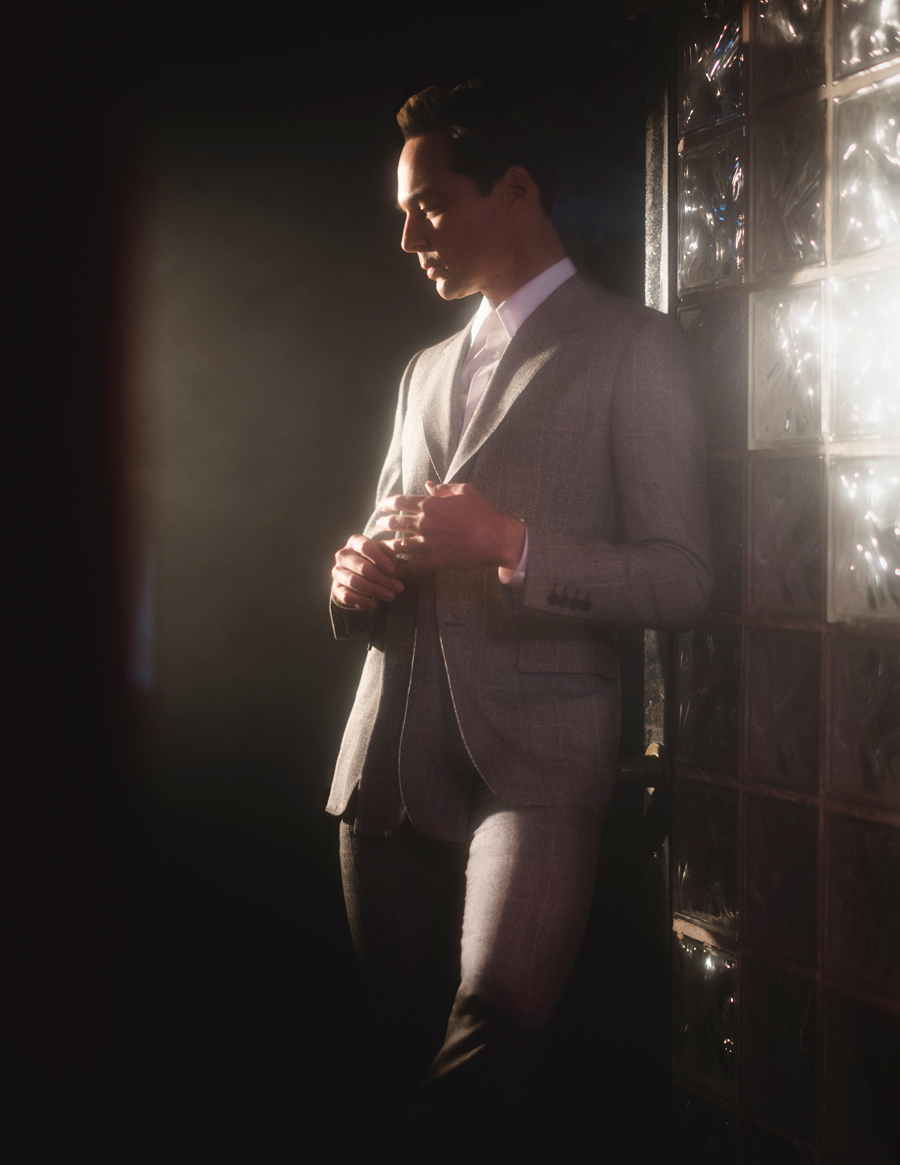
Suit and Shirt by Alexander McQueen
IRIS: I watched The Boys in the Band the day it came out on Netflix and still remember one of the final scenes where you’re about to walk out the door, talking about the loss of your father. It was such a strong scene. Did the memory of your father ever come into play during that scene?
Yes, I feel like my father affects all of my work in all ways. So, when it’s specific like it was there and it’s a character who also has lost their father then yes, I do think it is more obvious in my head. But I really do think about him everyday, and not in a sorrowful way. And not always even just celebratory either. I don’t know. I feel his presence, I firmly believe that. I always have, from the moment he was taken from us I felt that he was with us and always would be. I have never veered from that or doubted that. There can be a real gift to these tragedies if you’re able to appreciate your life more with these beings that are no longer.
IRIS: Do you think you get your dry sense of comedic timing from your mom or your dad.
My dad. No that’s not fair, I shouldn’t say that so quickly my mom would be insulted. She is very funny because she was a teacher. She was the talker; she was the more showman of the two of them. He was a quiet one. He had a very dry sense of humor. He had really good sense of timing. He knew when to throw in commentary, as it were. He knew when to throw in his one liner. I definitely didn’t appreciate it at the time. I mean some of it was dad humor, but it was being applied, I see now, very skillfully.
It’s interesting the older you get, especially when a parent is gone, you are able to see them as human and not the parental figure. I found it really frees me to get a clearer view of him which is another blessing of the tragedy.
IRIS: You did mention earlier you’re about to start a new movie.
Hopefully! Everything’s crazy now, as you can imagine, but a couple of years ago we had optioned a book called “Spoiler Alert: The Hero Dies: A Memoir of Love, Loss, and Other Four-Letter Words” by Michael Ausiello. I was on vacation when I read it. I don’t know if I really intended on crying so much during the vacation. And then Todd read it and reacted similarly to me, but he was the one to have the idea of optioning it for our production company and for me to star in the movie. I said I didn’t think that was a good idea. I thought it was a great book, but I wasn’t wanting to go through that heartbreaking experience. But the more I thought about it, I knew he was absolutely right; it is rare that I read anything that affects me at this level. So, we did option it, and it came out in the trades or whatever. We thew around director names, and one of the top dream names was Michael Showalter. We felt that he would be such a good fit for he clearly knows comedy and he clearly knows good entertainment. He has this grounded foundation of human connectivity. Anyway, the news came out that we had the option and, lo and behold, he contacted us. I couldn’t believe it came true!
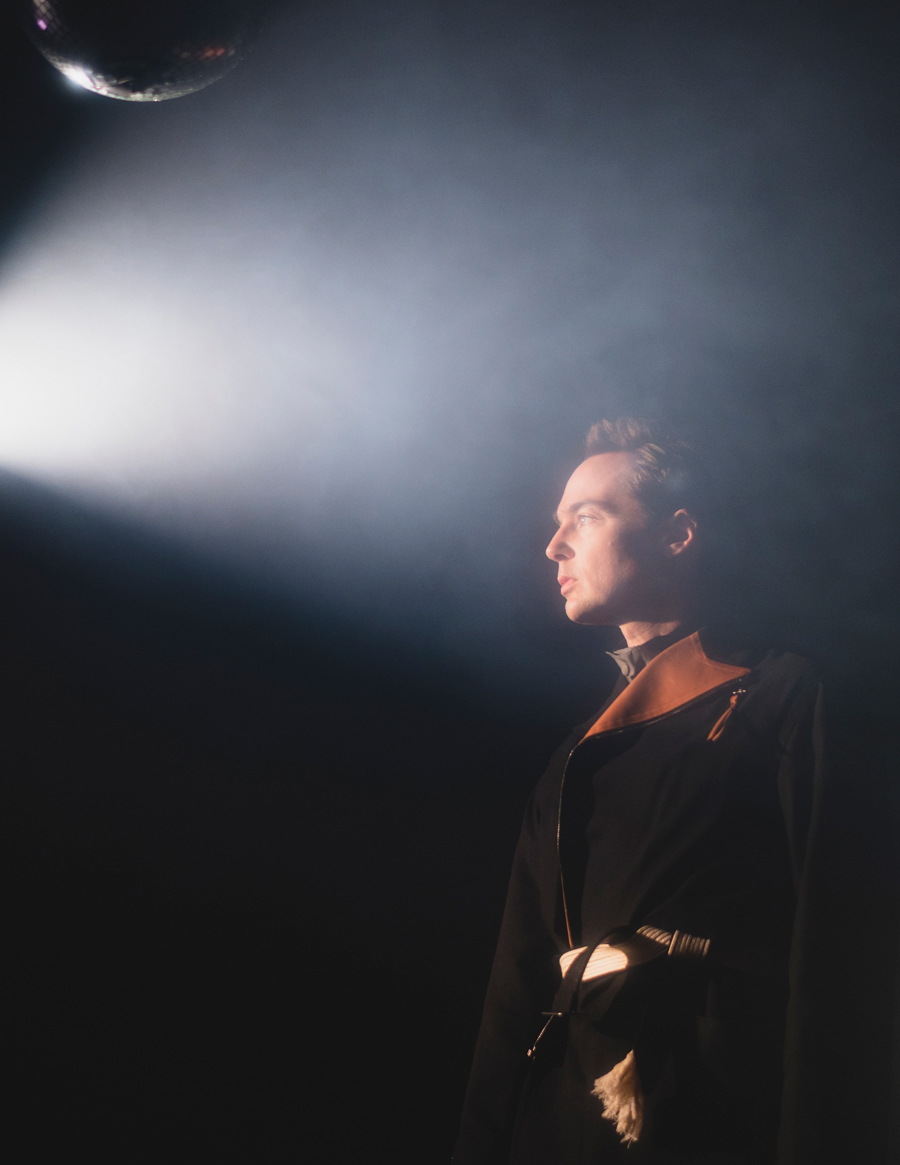
Jacket and Suit by Salvatore Ferragamo
IRIS: You have been lucky to have had a lot of great things fall into place it seems.
The universal system is always that fine balance between striving and letting go, and it can be hard when it’s important to you. I remember being in an acting class towards the end of graduate school, a class about auditioning, what it means, the practicalities. It wasn’t the most interesting acting class, but it was the most harrowing and stomach-turning class. I remember the teacher telling me the whole career of an actor is like trying to hold sand. If you squeeze too hard, you lose it. You lose a lot of it. It was such a good example and I always remember it because it bears repeating time and time again.
It’s true for love and dating too. You have to both try to not grasp the sand too hard and just let things happen. There is only so much you can do. Now why did you get me started on this?
IRIS: I’m going to start thinking of opportunities using that metaphor. See? You’re already helping me cope!
Well, that’s what I’m here for. I’m glad I can help the people!
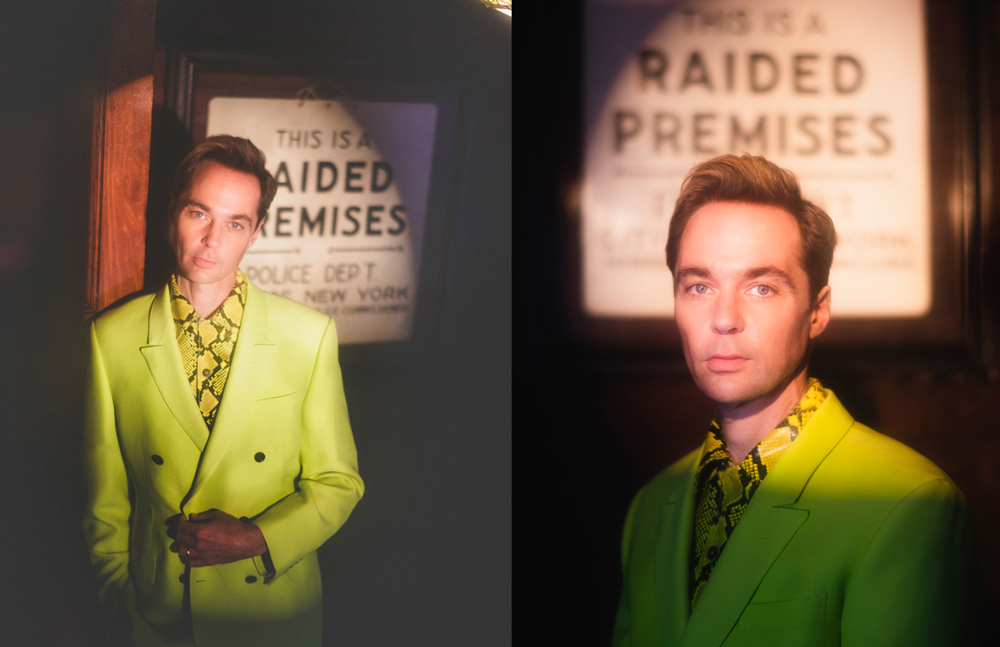
Suit and Shirt by Teddy VonRanson

